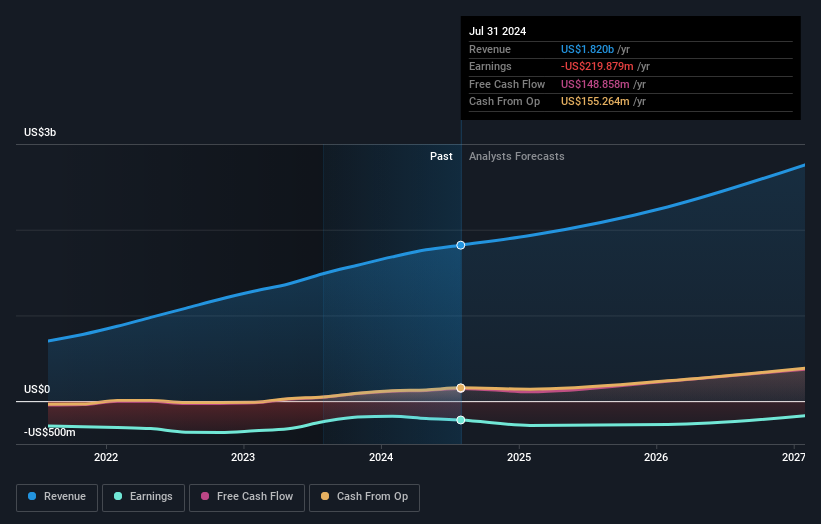- United States
- /
- IT
- /
- NasdaqGM:MDB
While MongoDB (NASDAQ:MDB) shareholders have made 131% in 5 years, increasing losses might now be front of mind as stock sheds 4.0% this week

When you buy shares in a company, it's worth keeping in mind the possibility that it could fail, and you could lose your money. But on the bright side, you can make far more than 100% on a really good stock. Long term MongoDB, Inc. (NASDAQ:MDB) shareholders would be well aware of this, since the stock is up 131% in five years. On top of that, the share price is up 23% in about a quarter. The company reported its financial results recently; you can catch up on the latest numbers by reading our company report.
Although MongoDB has shed US$857m from its market cap this week, let's take a look at its longer term fundamental trends and see if they've driven returns.
View our latest analysis for MongoDB
Given that MongoDB didn't make a profit in the last twelve months, we'll focus on revenue growth to form a quick view of its business development. When a company doesn't make profits, we'd generally hope to see good revenue growth. As you can imagine, fast revenue growth, when maintained, often leads to fast profit growth.
For the last half decade, MongoDB can boast revenue growth at a rate of 32% per year. Even measured against other revenue-focussed companies, that's a good result. Meanwhile, its share price performance certainly reflects the strong growth, given the share price grew at 18% per year, compound, during the period. So it seems likely that buyers have paid attention to the strong revenue growth. To our minds that makes MongoDB worth investigating - it may have its best days ahead.
The graphic below depicts how earnings and revenue have changed over time (unveil the exact values by clicking on the image).

MongoDB is well known by investors, and plenty of clever analysts have tried to predict the future profit levels. So it makes a lot of sense to check out what analysts think MongoDB will earn in the future (free analyst consensus estimates)
A Different Perspective
Investors in MongoDB had a tough year, with a total loss of 16%, against a market gain of about 32%. However, keep in mind that even the best stocks will sometimes underperform the market over a twelve month period. Longer term investors wouldn't be so upset, since they would have made 18%, each year, over five years. If the fundamental data continues to indicate long term sustainable growth, the current sell-off could be an opportunity worth considering. I find it very interesting to look at share price over the long term as a proxy for business performance. But to truly gain insight, we need to consider other information, too. Take risks, for example - MongoDB has 3 warning signs we think you should be aware of.
For those who like to find winning investments this free list of undervalued companies with recent insider purchasing, could be just the ticket.
Please note, the market returns quoted in this article reflect the market weighted average returns of stocks that currently trade on American exchanges.
New: Manage All Your Stock Portfolios in One Place
We've created the ultimate portfolio companion for stock investors, and it's free.
• Connect an unlimited number of Portfolios and see your total in one currency
• Be alerted to new Warning Signs or Risks via email or mobile
• Track the Fair Value of your stocks
Have feedback on this article? Concerned about the content? Get in touch with us directly. Alternatively, email editorial-team (at) simplywallst.com.
This article by Simply Wall St is general in nature. We provide commentary based on historical data and analyst forecasts only using an unbiased methodology and our articles are not intended to be financial advice. It does not constitute a recommendation to buy or sell any stock, and does not take account of your objectives, or your financial situation. We aim to bring you long-term focused analysis driven by fundamental data. Note that our analysis may not factor in the latest price-sensitive company announcements or qualitative material. Simply Wall St has no position in any stocks mentioned.
About NasdaqGM:MDB
Flawless balance sheet low.


